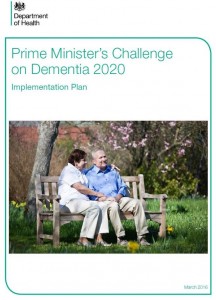“For people living with dementia, no one size of care package fits all,” explains Hilda Hayo, Chief Admiral Nurse and CEO for Dementia UK following the recent launch of a new joint declaration on post-diagnostic care by NHS England, the Department of Health and a broad range of partners from across the health and care sector…

“Care of this kind must be personalised, flexible, culturally relevant, and everyone should have equal access to it. Individuals living with dementia, their families and carers should receive appropriate care and support – from diagnosis through to end of life – to ensure they live the best lives possible.
This can only be achieved through collaboration and partnership working. That’s why I and my Dementia UK colleagues are proud to have been major partners in the development of the declaration. More than that, we are delighted to support this shared commitment between Government, health, social care, the third sector and other relevant partners as we work together to improve post-diagnostic dementia care. It is also heartening to see the declaration referenced in the Prime Minister’s recently published Dementia 2020 implementation plan.
 Dementia UK provides specialist one-to-one support and expert advice for people living with dementia through our world-class Admiral Nurses, and our Admiral Nursing model has been built on the foundations of partnership. Admiral Nurses play a unique role in care management by joining up the different parts of the health and social care system, and help the needs of family carers and people with dementia to be addressed in a co-ordinated way. Likewise, each Admiral Nurse service is operated as a partnership between Dementia UK and a host organisation. The majority of host organisations are NHS Trusts, but they also include charitable organisations like the Royal British Legion and private providers like the Good Care Group.
Dementia UK provides specialist one-to-one support and expert advice for people living with dementia through our world-class Admiral Nurses, and our Admiral Nursing model has been built on the foundations of partnership. Admiral Nurses play a unique role in care management by joining up the different parts of the health and social care system, and help the needs of family carers and people with dementia to be addressed in a co-ordinated way. Likewise, each Admiral Nurse service is operated as a partnership between Dementia UK and a host organisation. The majority of host organisations are NHS Trusts, but they also include charitable organisations like the Royal British Legion and private providers like the Good Care Group.
This partnership approach to help families live with dementia has proven to be very effective – both for the families living with dementia and the health and social services. Admiral Nursing helps to greatly reduce the costs on both health and social care budgets. An evaluation of an Admiral Nurse pilot study in South Norfolk identified savings of over £440,000 for health and social care in the area, in just the first 10 months. The South Norfolk service also reduced contact time of affected families’ with GPs, nurses and social workers, and helped to avoid any unnecessary hospital admissions and care home costs.
In the first 12 months of launching an Admiral Nurse service in Sutton – which is hosted by Sutton County Council, Sutton CCG, and Dementia UK – we were able to show cost savings of £296,466 in health and social care. An evaluation report revealed that 100 percent of carers had said the service had improved the support they receive for caring, 100 percent of carers said the service had improved their quality of life, and 88% of carers said the service had reduced the stress they were incurring due to their caring role.
Partnership working is proven to help families living with dementia, which is why this declaration is such a positive step forward for us.
8 comments
Comment by Jonathan Wise posted on
it is a very good idea to use a partnership model, for dementia treatment.
We cared for my father in the early stages of his dementia, as his care package did not meet his needs, it took 20 months to find the right provider, and Social Services had priority with state funded sufferers, who pay less than privately funded care home users.
We found great differences in the quality of care in these homes, the worst being privately owned and the best being run by the likes of St. John's and community/not for profit outfits.
Is your initiative going to remedy these points?
Why should NHS money go to private care providers and their shareholders?
Why not use a not for profit care provider or a NHS/Social Services team?
How can you justify this as a good use of scarce resources, in this instance?
Comment by Jackie Lamond posted on
Can you please explain why social services are pulling out of long term dementia care when continuity is vital and essential to support the individual living with dementia to remain in their own home.
Comment by Shirley Bascombe posted on
Absolutely agree Jonathan, why should NHS money go to private care providers and their shareholders. We need solid practical help from the NHS to support people in their own homes and if/when that becomes impossible, local, quality,caring, not for profit, care homes.
Comment by Hilda Hayo posted on
Hello Jonathan and Shirley,
I strongly believe that if all providers follow the partnership model and work together to develop pathways for people living with a diagnosis and their families, savings could be made, and then redirected to provide the most appropriate service to meet the families needs. It is very important to involve families in the development of appropriate pathways, services and interventions as all to frequently they are developed and commissioned without this. As you have identified, the delay in providing appropriate support is stressful for families and adds additional distress at a time the family is most vulnerable.
Unfortunately the NHS and Social Services are unable to meet all of the growing needs of our population due to reduced resources, and so other providers (e.g. Charities, not for profits, private companies) have developed their place in dementia services. The majority have a good reputation and provide a high standard of service but unfortunately a small minority do not. These providers should be challenged and encouraged to improve their practice and services, and if they do not they should be held to account and if necessary formal actions need to be taken. I would strongly advise families who have concerns re: a service to speak to them directly expressing their worries and if not resolved to take this further e.g. Management of the service, funders (if NHS or Social Services funded), Care Quality Commission.
I agree that the best place for care to be delivered is in the persons's own home (as far as is possible) and more money needs to diverted to this rather than to long stay care provision. It is not only better for the person living with the diagnosis and their families but is also more cost effective. However, it should be recognised that not all people with a diagnosis of dementia and their families are able to continue with home care, for many different reasons, and they should not feel guilty for having to make the decision for long term care.
Comment by Susan Paul posted on
Good morning. My mother in law is currently utilising an emi residential assessment bed. She was given a diagnosis of Alzheimer's late last week. We're awaiting an mdt. My question is this, does this programme cover Wales?. If not what should we be looking at to make her life easier and better? Thank you in advance. Susan Paul
Comment by Shirley Bascombe posted on
Thank you for your reply Hilda. Since my comment 19/3/2016, following years of caring for my father I had to accept respite care, which proved, at best, inadequate for his needs and mine. I agree that providers should be challenged but when you are sleep deprived and as you say, vulnerable, this is not an option and the priority is just to get your loved one with complex dementia to a safe and secure environment. Currently CQC reports are too infrequent and, in an ever changing care home environment, the information cannot be relied on. It saddens me that most of the homes in my area carrying a CQC report are rated less than "good" requiring improvements in many areas. NHS/Social Service personnel, with their reduced resources, are fully aware of unsuitable care homes draining their resources but they have no option other than to use them so it is not in their best interests to challenge or hold them fully accountable. Much tighter controls are needed.
Comment by Lynda Henderson posted on
I'm in Australia and am horrified at the lack of dementia specific training among health and care professionals.
What additional training does an Admiral nurse undertake in addition to being an RN?
Can you estimate how many clients would be case managed by any Admiral nurse?
How are you employed? In Australia RNs cannot work independently.
Comment by Orchard House posted on
Hi
people with dementia needs more care and assistance. Your idea of model work with partnership is ideal. orchard house in bexhill provide good care for people with dementia.